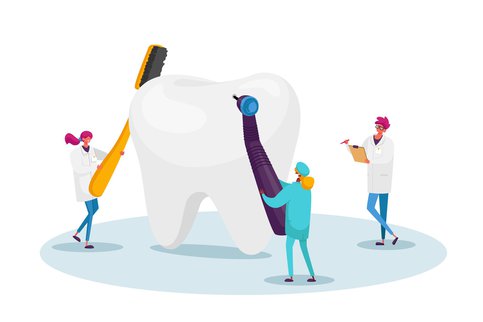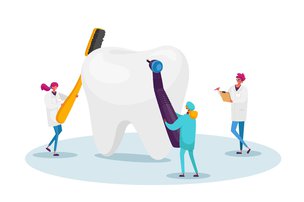Oral health is a crucial factor that affects the quality of the lives of the elderly. It also impacts their overall health and wellbeing. Here are some reasons why oral care is vital for the elderly.

As we grow older, our bodies undergo various changes. It is a no-brainer that we are more likely to face multiple health complications as time goes by, including in our mouths. Oral health is closely linked to overall health. Therefore, by taking care of your dental health, you are actually taking care of your health.
The changes that occur require specific considerations when it comes to oral health. It is a proven fact that poor oral health can compound other health concerns, especially to senior citizens. The best way around this would be to maintain a stable oral care regimen which would impact overall health.
Here’s what you need to know regarding oral care in older adults.
Why oral care is important...
Your body becomes feebler as you age. This not only happens to your physical strength but also to your internal body, where your immunity reduces. As this happens, you become more prone to old-age health concerns.
Furthermore, the likelihood of taking lots of medication increases as you get older. For most, the medication will work with minimal side effects. However, most of the common medical side effects are usually seen in the mouth.
To avoid further damage to your dental health, it would be prudent to note the best ways to take care of your oral health.
So, why are oral care and choosing a careful orthodontist or dentist so important in later life?
5 Reasons Oral Care Is Important In Later Life...
1. Infections could be deadly
As mentioned earlier, your oral health can directly impact overall body health. Some of the illnesses that are quite common with old age can be deadly, and some of them can be traced back to oral health. Some of them include:
- Pneumonia
We have bacteria in our bodies, more so in our mouths. If you do not adhere to a strict dental health plan, your mouth can easily harbour deadly bacteria, which can be aspirated into the lungs. This process might lead to a fatal infection of the lungs known as pneumonia.
- Diabetes
Oral infections can cultivate an increase in body sugar levels which potentially leads to diabetes. Although this disease is treatable, it is not curable. This is why it is essential to know how to take good care of your oral health to avoid dealing with diabetes in later life.
It is also important to note that senior adults with pre-existing diabetic conditions are at a high risk of getting oral infections, such as gum disease.
- Heart disease
There is also another deadly infection known as endocarditis. This happens when an infection from the mouth travels to the inner linings of the heart. Although this is a treatable health concern, it does put a lot of strain on the heart, and it could become deadly if not checked early enough.
- Oral cancer
Someone that doesn’t take good care of their oral health may be at risk of getting oral cancer. This type of cancer is often linked to smoking and chewing tobacco, with minimum regard to proper oral hygiene.
2. Dry mouth
2. Dry mouth
Earlier in this post, we mentioned how people tend to consume more medication as they grow older. One of the most common side effects of some of these drugs is dry mouth. This is a condition that occurs when there is less saliva in your mouth, which can become quite debilitating and uncomfortable if untreated in time.
The mouth needs saliva to protect you from various oral infections, such as cavities and gum disease.
Furthermore, chronic dry mouth may affect someone’s ability to taste, chew, and swallow food. Some patients have also reported speech impediments as part of the results. Also, since the patient is unable to eat, taste, or chew food properly, they might develop malnutrition.
3. Gum disease (Periodontitis)
Almost half of all adults aged 30 and older have some form of periodontal disease, according to the CDC. Periodontitis, better known as gum disease, is a dangerous condition as it can easily spread to other parts of the body. Besides that, eating and even drinking fluids may become a painful experience with gum disease.
4. Tooth loss
Without a proper oral care plan in mind, one can be at a greater risk of losing their teeth as they grow older. According to the CDC, nearly one in every five adults above 65 years have lost their teeth.
If you do not take good care of your oral health, you can easily be on the list of those that suffer from tooth loss. Whenever this happens, not only will you face difficulties in eating a variety of food (such as fruits), but you’ll also have to deal with self-confidence issues due to poor dental aesthetics.
5. Tooth decay
Tooth decay is one of the biggest reasons why oral care is so critical in later life. Without a proper dental hygiene plan, bacteria that would harm the tooth enamel can build up, causing cavities and tooth decay.
How to improve dental health for seniors
So, what can be done to mitigate the negative impacts of the lack of proper oral health for seniors?
- Maintain regular dental visits - it is recommended to visit a dental clinic for routine checkups at least twice a year. These routine checkups are crucial as they help your dental health practitioner determine any imminent concerns to take care of as soon as possible. It would be prudent also to understand that you should know how to pick a careful dentist or orthodontist to take charge of your oral health. This is because senior adults are pretty fragile and need close monitoring.
- Maintaining regular dental hygiene - keeping your teeth and mouth clean at all times is one of the best ways to avoid most of the dental issues that may arise during old age. Adhering to a strict brushing and flossing schedule would be quite beneficial.
- Watch on lifestyle - your lifestyle also contributes a great deal to your oral health in later life. You need to quit smoking and using tobacco products. You should also avoid foods high in sugar, more so sticky high-sugar foods. Furthermore, it is crucial to have a good understanding of all the medication consumed at old age and discuss with your doctor so that they do not recommend medications that may reduce the production of saliva.
Bottom line
Although the elderly tend to have more oral health concerns than young people, it is still quite manageable. Having a consistent oral care routine and regular visits to a caring dentist or orthodontist for checkups can help one maintain a bright, natural smile for longer.
Are you looking for a care service? Contact us for complimentary support with your search!
Call us on 01865 680331
Send message

